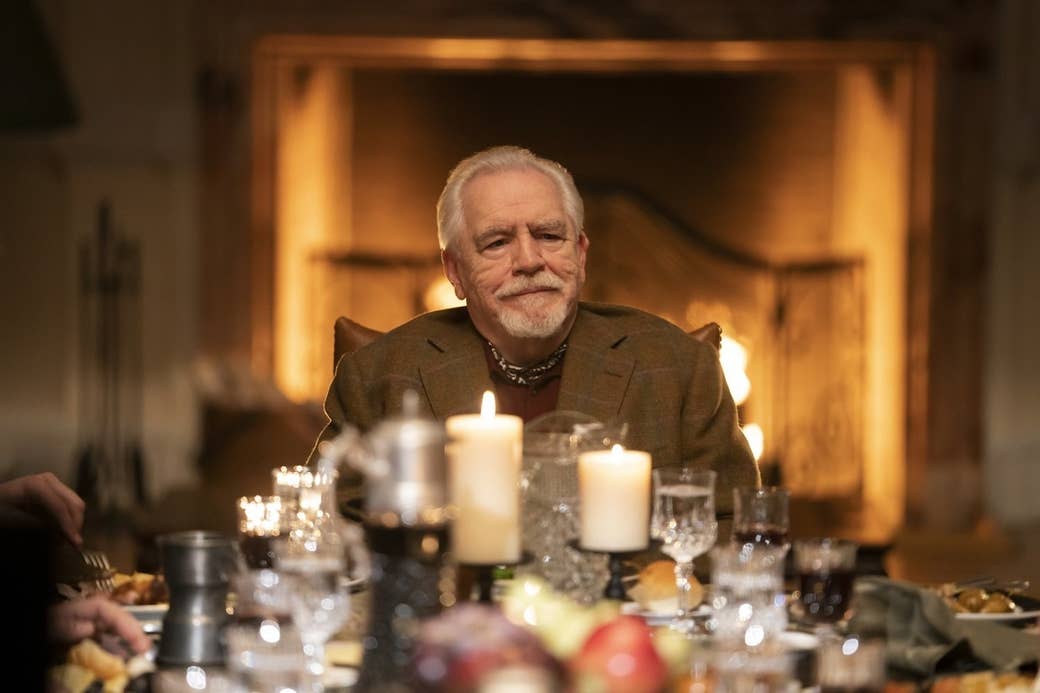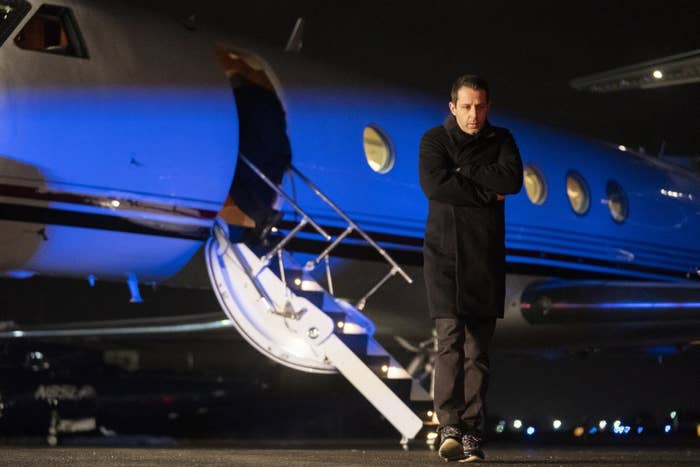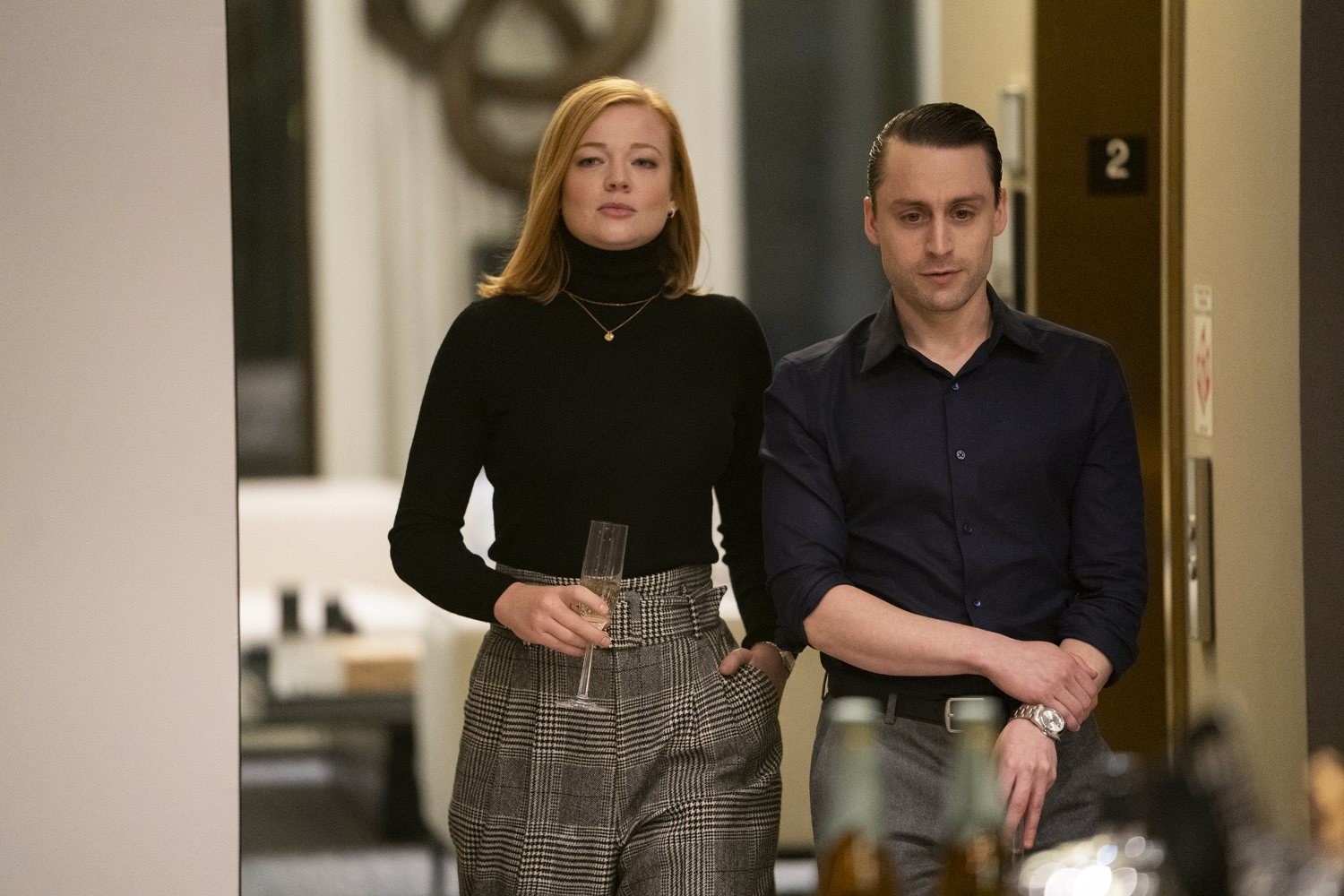
On the second episode of the new season of the HBO show Succession, Kendall Roy (Jeremy Strong) laid waste to an online publication that sort of resembled the one you're currently reading.
Vaulter, may it rest in peace, also had a bit of Gawker, a touch of Vulture, a little Vice. Of all the fictional digital publications the peak TV era has given us — your JazzHates and your Sluglines — it was the one that most looked and felt like a real internet outlet, with its open-plan office full of laptop-wielding youngish writers, site traffic boards, glass-enclosed conference rooms, and selected headlines framed and mounted on the wall ("Wait, Is Every Taylor Swift Lyric Secretly Marxist?"). Vaulter died just like a real internet outlet, too: acquired by a large conglomerate that promised support, only to strip the place for parts after a few months of bad traffic and talk of unionization. For anyone who works in this world, the cry from founder Lawrence Yee (Rob Yang) that "Facebook changed their algorithm" is as chillingly familiar as Kendall's plan to fire almost everyone and start relying on user-generated content.
It should have been depressing, watching a scene from many an actual digital bloodbath staged in excruciating semisatirical detail. Instead it just felt disorienting, like getting a chance to admire your own intricately staged murder from a distance. Media outlets often exist only according to the whims of a wealthy few — ones whose judgments from on high can have enormous consequences for everyone on the ground. But how often do we get a billionaire's-eye view on those decisions? Much less one that depicts those decisions as capricious as they often feel from the outside?
Kendall — who's the reason Waystar Royco, his family's corporation, acquired Vaulter in the first place — argues to save it while his brother Roman (Kieran Culkin) suggests they kill it because he wants to hurt Kendall. Their father, the notorious Logan (Brian Cox), is still punishing Kendall for his recent betrayal, and also only really cares about legacy media anyway. Whatever viability the digital startup has is obviously incidental compared with these internal power plays. Four hundred and seventy-six people get flicked off payroll like gnats because, as Kendall numbly explains, his dad told him to.
Succession is a series about monstrous rich people that manages to be exhilarating and grim as hell at the same time, which is why a recent piece in the Week questioned how effective its critique of the ultrawealthy in general, and a Murdoch-inspired clan in particular, could really be. "Does Succession hate the super-rich? Does it really?" Aaron Bady wondered. He pointed out that simply by nature of the Roys being the protagonists, "you will suddenly realize that you've started to sympathize with these extremely bad people."
While the Roys certainly didn't spend the slow-to-start first season of the HBO drama establishing themselves as a force of good, the second season has been firmer in demonstrating the family's culpability when it comes to making the world a worse place. If the snuffing out of Vaulter was less explicitly wicked than just cruelly recognizable, the explorations of the Roy-owned Fox News stand-in ATN have been less ambiguous: As the newly installed chair of global broadcast news, Tom (Matthew Macfadyen), puts it, ATN shapes the debate, and "the debate keeps on getting shaped like a burning cross."

But Brady's larger point, one equally applicable to other antihero-centric narratives, is worth considering: Does Succession undermine its own class politics by creating sympathy for its characters? It is impossible to watch the series without investing in these people. (Well, perhaps not Connor [Alan Ruck], who's embarked on a hilariously uninformed run for president that might, given the cynicism of the show and recent history, very well work out.)
Kendall, Roman, Shiv (Sarah Snook), Cousin Greg (Nicholas Braun), and the rest of the family, however, are rounded out with relatable struggles: everything from addiction to sexism to feeling like the family fuckup. The Roy siblings grew up in an environment of unimaginable privilege with little to nothing resembling normal human affection, and it's enabled them to be deliciously awful to one another as only people raised to think of life as a series of hostile takeovers can be. When Shiv tells Roman that she thinks he's talented and she loves him in this season’s premiere, he responds, "You're such a fucking bitch," because he assumes she's toying with him. And the thing is, she might be.
While Succession's a lot more overtly caustic about its characters than its fellow 1 percent drama Billions, it's also more tender with them, portraying their private pain and playing with viewer loyalties as different siblings rise and fall. There's a horse race quality to their competition, and a desperation to the floundering of outsiders like Tom and Cousin Greg; it's difficult not to get swept up in it all. How can you not feel for Kendall, who, having spent the first season campaigning against his father, has now been so crushed under the man's boot that he looks like a flattened husk? How can you not understand Roman's insecurity as someone who's never been taken seriously? How can you not take some pleasure in the rise of Shiv, the daughter who's been so roundly dismissed that Roman games out his strategy in front of her without even seeing her as a potential player?

But at the same time, it's hard to imagine how anyone could watch Succession and not understand that whichever of these characters might win, the rest of us still lose. There's no good guy who, if crowned, will go on to triumphantly dismantle the most harmful parts of the Roy empire and donate its earnings to ProPublica. There's only a collection of stunted adults who see themselves as separate from the rest of humanity and who are warped by their need to get approval from a man they all at least partially loathe.
While the first season of the series was more insular in how it laid out the Roys' awesomely damaged family dynamics, the second has turned outward to show the ways in which they damage everything they come into contact with — poor little rich kids or not, they give far more than they get. Succession invites you to choose your fighter and understand that each one of them will just do whatever's necessary to shore up the company that provides them with the most power and wealth.
This includes Shiv, who is, at least in theory, the progressive one, the reasonable one, the character who initially distanced herself from her family's more dreadful dealings. Her rise in the show’s power rankings this season has coincided with a shedding of her more crunchy stylings and her political ambitions for Bernie Sanders surrogate Gil Eavis (Eric Bogosian). One minute the socialist senator is offering her a position as his future chief of staff, and the next he and Shiv are nastily parting ways over the other's hypocrisy with regard to how each of them benefits from the Roy family funds.
No matter that Shiv is the one who recommended he accept the campaign contributions in the first place — her disgust at how quickly Gil embraces perks like the use of a private jet becomes an excuse to ditch him and take up her dad's (not entirely trustworthy) offer to be his successor. And while Shiv suggests she intends to clean the company up once she's in charge, she's perfectly comfortable installing her husband, Tom — or "some guy who works for me," as she describes him to a hookup — at ATN for her own benefit. (He, meanwhile, gleefully prepares to do his own rounds of layoffs to prove his cost-cutting prowess, a process he describes in terms of skulls to be collected.)
This is looking like Shiv's year, which is to say she feels as doomed to an eventual downfall as Kendall did. The only thing more certain than the fact that the Roys protect their own is that patriarch Logan can't really see himself surrendering power to anyone. There's no ethical rooting for any of these characters under capitalism, which is why the question of whether the Roys are adequately evil, as Bady asked in that the Week piece, feels beside the point. "Evil" suggests they need a motive for all the harm they do beyond greed, ambition, and personal grudges.
The horror comedy of Succession isn't softened by the raw, terrible humanity of these characters — it stems from it.
The horror-comedy of Succession isn't softened by the raw, terrible humanity of these characters — it stems from it, and from the way that people accommodate the Roys’ most ridiculous whims because of their cash and clout. In the third and most recent episode, Frank (Peter Friedman) — the former family friend and Waystar Royco chief operating officer who was humiliatingly fired in order to make room for Roman — was invited to the company's annual executive retreat. Not only did he come crawling back for an event that devolved into Logan making attendees crawl on the ground and wrestle for sausages in an absurd loyalty test, but he also accepted a subsequent job offer. Being well paid and abused is apparently preferable to joining the masses.
Succession doesn't need malevolence when it has the corrosive forces of money and power, to which no one is shown to be immune. The appeal of watching the series comes from the way it excuses no one — including those of us watching, appalled and entertained — from the devolution onscreen. The series makes no effort to resemble a documentary, but it sometimes dips into camerawork (handheld, with shaky zooms) intended to evoke one, as if to disrupt any sense of distance the viewer might otherwise have. The Roys may be fictional, but the world they live in is meant to be ours, and they rule over it not because they're evil geniuses but because we let them.
One of the key storylines this season involves a rival media company named Pierce, a liberal bastion of credible news owned by a family that has contempt for everything Logan represents. Against all advice and every industry indication, Logan suggests, not for the first time, that they attempt to acquire Pierce to ward off the Waystar Royco acquisition attempt that Kendall initiated and that's proceeding without him. Legacy media may be contracting, but Logan's not the forward-looking type — he'd rather make an apocalyptic attempt at being the last company standing. Given Vaulter's fate, and Waystar Royco's reputation overall, the potential takeover of Pierce feels both ill-advised and sure to spell doom for what's presented as one of the last legitimate major news sources still in existence. Yet no one wants to tell Logan no.
The source of Logan's fixation on buying Pierce is only revealed once he’s out of the room: He resents the fact that it's what his estranged brother watches, and that one of their newspapers once made fun of him. The idea that reputable media would meet its demise out of spite between aging siblings is the kind of amusingly dark, all-too-believable touch Succession has perfected. If we're not going to save ourselves from the rich, the show suggests, then we'll have to be content with watching them squabble over whatever's left of the world after they’ve tired of destroying it. ●
